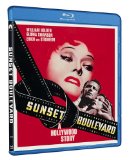| Reviews & Columns |
|
Reviews DVD TV on DVD Blu-ray 4K UHD International DVDs In Theaters Reviews by Studio Video Games Features Collector Series DVDs Easter Egg Database Interviews DVD Talk Radio Feature Articles Columns Anime Talk DVD Savant Horror DVDs The M.O.D. Squad Art House HD Talk Silent DVD
|
DVD Talk Forum |
|
|
| Resources |
|
DVD Price Search Customer Service #'s RCE Info Links |
|
Columns
|
|
|
Sunset Boulevard
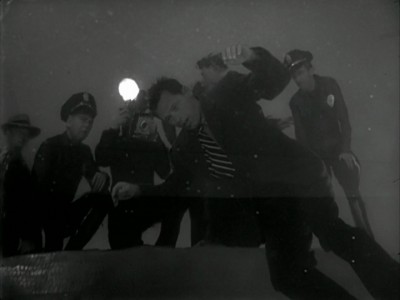
Please Note: The images used here are taken from a prior standard-definition DVD release, not the Blu-ray edition under review.
By 1950, the tirelessly skeptical and sardonic Billy Wilder was already much more than qualified to make a picture about Hollywood; over the preceding decade, the Austrian-born director (who had fled Europe for Hollywood in the wake of Hitler's rise) had become one of Tinseltown's most prominent, successful, and well-regarded figures, having written the sparkling script for Lubitsch's 1939 gem Ninotchka and co-written/directed Double Indemnity (1944) and the award-winning The Lost Weekend (1945). But Sunset Boulevard is, famously, anything but a celebration, much less an act of gratitude (if you want to see a movie that is the insouciant embodiment of biting the hand that feeds, this is the one); it is, like those prior directorial successes, more a superbly crafted, rather uncompromisingly dark-hearted noir than anything else. Wilder's own relatively grand success apparently hadn't dulled the edges of the ax he (and anyone who's ever had to beg and hustle to get their foot in the door) had to grind against the unfulfillable promises of the self-aggrandizing dream factory, with its hordes of malcontented wannabes and much smaller, elite group of those on the right side of the imposing studio gates; the picture is, truly, ax-sharp, penetrating and unforgiving and fascinating in its observations. As the worn but always applicable Hollywood proverb has it, "Many are called, but few are chosen"; in Wilder's vision, the former are desperate, the latter delusional, and his own personal examination of the town that writ dreams large for an awestruck, enraptured world takes the form of an extended postmortem performed with no small amount of mordant relish.
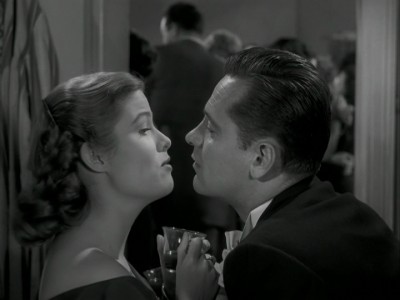
Wilder's autopsy takes the narrative form of a guided tour of Hollywood despondency and dementia, conducted from beyond the grave. The first thing we see is the corpse of our protagonist (shot from below, underwater, for a brilliant, indelible opening image that instantly explodes the notion of Wilder as a dyed-in-the-wool writer, more a verbal than a visual director); the first thing we hear is his literally disembodied voice-over narration introducing himself as Joe Gillis, who struggled as a down-and-out screenwriter before his untimely demise. Gillis promises, in a tone of rueful, ice-cold black humor (a tone to which the story will reveal him to be fully, self-deprecatingly entitled) to recount for us the events of the past six months, which led him from his poor one-room apartment and increasingly desperate lack of employment to his death in such oddly luxurious surroundings. When we fade back to six months ago, we find that Mr. Gillis was a bum, growing disillusioned by the day after working on an endless string of B-pictures, constantly having any interesting ideas misshapen by the studios to fit their formulas, and now finding even that poor luck running out, his spec scripts unsellable and the repo men breaking down his door to repossess his car. It's while he's on the lam from these agents of fiduciary justice that Gillis experiences the fateful blowout that delivers him unto his temporary, Faustian salvation and ultimate doom. He pulls his ailing car into the drive of a decaying mansion hidden from the view of the boulevard and, after hiding the endangered vehicle, finds himself in the clutches of this haunted house's bizarre residents, who have mistaken him for a doctor that's been called to tend to a dying pet monkey. What kind of extravagant, self-indulgent, eccentric person has a pet monkey, a doctor who makes house calls for it, and will soon be performing a pageant-like funeral in its honor? A pampered, sheltered ex-starlet for whom the lines between reality and movieland fantasy have become permanently blurred, of course. Former superstar/Cecil B. DeMille protégée Norma Desmond (Gloria Swanson, herself a huge silent-era silver-screen attraction) has been holed up, Miss Havisham-like, during the decades since microphones came in and, in her estimation, ruined the movies. But she's plotting a comeback in between answering all her fan mail, and after she gets over her initial indignation toward the handsome young writer she mistook for a monkey doctor, she decides to recruit him.
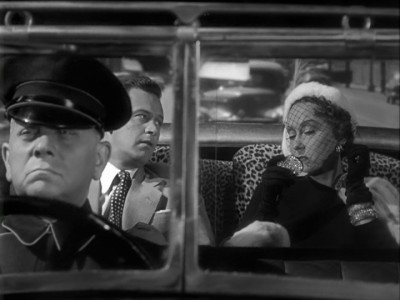
Like Eli Sunday and Daniel Plainview in There Will Be Blood, the meeting of these two personae constitutes the sparks-producing clash of, in one corner, an opportunist who mistakenly thinks he has the upper hand by default, and in the other an egotist whose personality turns out to have an insatiable, immoveable, and deadly force behind it. Gillis condescends to work on Desmond's hyper-inflated, nonsensical morass of a script, eventually leading her on in more ways than one as he and her driver/valet, the mysterious, German-accented Max (the great, silent-era director Erich von Stroheim, disowned by Hollywood for his excesses, who had also acted to fine result in Renoir's La Grande Illusion) allow the clearly insane actress to nurse her impossible fantasy of the return to the big screen that she imagines, in a fallacy long encouraged by the strangely protective Max, has been awaited all this time by hundreds of thousands of fans. The cash- and work-starved Gillis initially resists Desmond's attentions, but finally consents to being kept and pampered (the kind of compromise that, frankly, we've seen the potential for in him from the beginning, or at least since his voiceover confessed to us that it's only his pride keeping him from returning, tail between his legs, to his gig as a small-town newspaper journalist in Ohio, after having his prestige-picture ambitions dashed thoroughly by the process of actually writing for the pictures). It's horrible and humiliating, but we sense that Gillis shares our fascination for the spectacular, entirely unreal allure of Desmond's curdled wealth and glamor, even as she embarrasses him with her attempted seductiveness and she and her gang of fellow ex-actor "waxworks" (played by Buster Keaton, among others) treat him like a hired-hand lackey. Meanwhile, Gillis finds that a pretty young script reader, Betty Schaffer (Nancy Olson) who's rejected his latest bomb and is engaged to an assistant-director friend of his (Jack Webb, Dragnet), actually thinks he's talented despite his sellout stooping to hack work, and wants him to collaborate with her on an adaptation to the movies of one his short stories. Gillis begins moonlighting, living a double life between this girl who has a head on her shoulders (except when it comes to Gillis, whom she's slowly but surely falling for) and the woman who's keeping him. Gillis's conscience torments him about deceiving his pal with his fiancée and keeping the girl in the dark, but his attempt to come clean and redeem himself only seals his fate at the hands of the jealous, preening, fragile woman -- larger than life to the very bitter end -- whom he so foolishly thought he could take for a ride.
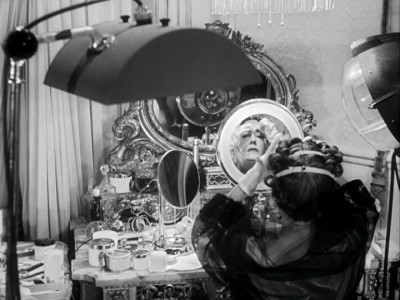
The acid with which Wilder and cowriter Charles Brackett have filled Sunset Boulevard to the brim still stings, but it also entertains impeccably. Working with a master of the hardboiled like Raymond Chandler on a noir like Double Indemnity must have tuned Wilder's ear to the sound of world-weary sarcasm, and the epigrammatic dialogue here ("He was a smart producer, with a set of ulcers to prove it"; "Rudy never asked any questions about your finances; he'd just look at your heels and know the score," etc.) delivered with just the right amount of jaded snarl by Holden, whips through the air like arrows before hitting its target. Swanson, too, has a fine intuition for how to perform her even more memorable dialogue; Holden is excellent as well, but hers is the riskier role, and she pulls it off boldly and courageously, holding herself up for much potential ridicule with the initially silly, then scary-sad, incongruity of Desmond's hyper-dramatic gesticulations and enunciations -- silent-film acting in the unflattering context of a modern talkie (and Desmond, crucially, never stops acting) -- but staying all the while perfectly true to this character's eccentric, narcissistic, not entirely inaccurate conviction that "I am big; it's the pictures that got small!" (As evidence, Wilder offers us a deliciously self-reflexive moment when, with Desmond ostensibly screening her great old classics for Gillis, he flashes an ornate, hyperemotional scene of the much younger Swanson in a Stroheim-directed "big" picture, 1929's Queen Kelly.)
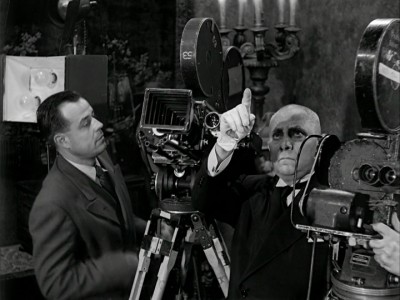
Wilder and Brackett, wrangling the talents of cinematographer John F. Seitz (who had also shot Lost Weekend and Double Indemnity), editors Arthur Schmidt and Doane Harrison, and Franz Waxman's half-rousing, half-taunting score, create the perfect tone of shadowy, stagnant, rundown glamor throughout, at times verging on the Gothic (as with the wind wheezing through the pipe organ in Desmond's overstuffed sitting room). Through brilliant use of lighting and mise-en-scène, the feel of faded elegance -- stale cigarette smoke, curtains closed during the daytime, stifling dissatisfaction in the face of wilted decadence -- permeates nearly every frame, while the cutting and the music marshal that shadowiness into dread, unstoppable noir propulsion, the sense that a sure-to-be-unkind fate has kidnapped the hapless Gillis (and us) and is now hurtling him off into a nighttime world toward his poetically licensed doom. It's a punishment his restless, innately guilty conscience craves and, he as much as informs us, accepts to the point of welcoming it; the film implicates us so stealthily and irrevocably in what amounts to its philosophically and emotionally sadomasochistic game that we, too, accept and welcome Gillis's ignoble death, making it possibly the most satisfying picture to ever sport such an unequivocally unhappy ending. Sunset Boulevard isn't a light movie at all, nor is it really a very "pleasant" one, but it is endless fun to watch and rewatch. In it, Wilder left us something not at all warm, but sharp and hard as a diamond, and ruthlessly entertaining -- a beautifully turned-out nightmare from the dream factory, fleet and supple in its nastiness, that has all the staying power of a classic and stands as a perfect example of deluxe, Golden-Age studio-system resources and craft animated by an inspired artist's singular, willful vision.
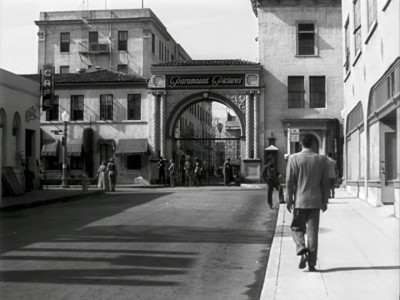
THE BLU-RAY DISC:
The AVC/MPEG4 encoded, 1080p-mastered transfer is superb; surely, Sunset Boulevard hasn't looked quite this good, while retaining all its film-like qualities, since the first brand-new print ran through the projector over 60 years ago. The contrasts in John F. Seitz's black-and-white cinematography are stunning here; the image is solid (it is, fittingly, a dark-ish picture, lighting-wise, and all dark/black sections of the screen are stable as can be), everything is sharp and clear, and there are virtually no signs of print wear. No discernible edge enhancement or aliasing mar the picture, either, and the celluloid grain has been left almost entirely untampered-with. Overall, the picture quality is one of the best I've seen in an older film's transition to Blu-ray.
Sound:The disc's Dolby TrueHD soundtrack is also excellent, preserving the film's original mono sound with great clarity, depth, and resonance; all dialogue, Franz Waxman's score, and even that spooky pipe organ in the mansion on Sunset sound full and rich, with nary a hint of crackle, hiss, distortion, or imbalance.
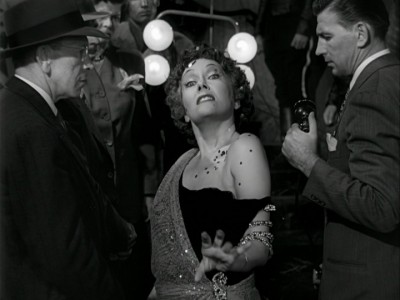
--A new supplement exclusive to the Blu-ray edition is a deleted scene that would have been a sort of prelude to the New Year's party scene: Before Joe Gillis arrives, his movieland pals have all gathered round to sing a rueful but cheery rendition of a ditty befitting the milieu called "The Paramount Don't Want Me Blues" by ray Livingston and Jay Evans (the Oscar-Winning Hollywood songwriting duo that later wrote Debbie Reynolds's "Tammy" and "Que Sera Sera," sung by Doris Day in The Man Who Knew Too Much).
Extras grandfathered in from 2002's collector's edition DVD include:
--Full-length feature audio commentary by author and Sunset Boulevard expert Ed Sikov, which alternates between insightful observation, astute interpretation of certain scenes, an outlining of the film's structure, and chatty, anecdote-filled musings on the film's preparation and shooting, all bulwarked by Sikov's clear familiarity with Wilder's personal and artistic biographies.
--"Sunset Boulevard: A Look Back" (25 min): Further discussion of the film with Sikov, actress Nancy Olson, and the late, great critic Andrew Sarris, along with input from Paramount producer A.C. Lyles and Broadway's "Norma Desmond," Glenn Close, all of whom provide either intriguing firsthand recollections or appreciative critical observation.
--"Franz Waxman: The Music of Sunset Boulevard" (15 min.), in which film music historian (and Waxman's son) John Waxman, storied film composer Elmer Bernstein, and conductor John Mauceri offer an in-depth discussion that runs the gamut from Waxman's bio to the processes of scoring a picture in the old Hollywood to the ingenuity and aptness of Waxman's specific cues for Sunset Boulevard.
--"Edith Head: The Paramount Years" (14 min.), which gives us the rundown on "the most famous costume designer in motion picture history" by her biographer, David Chienchetti, designer Bob Mackie, and actress Rosemary Clooney (dressed by Head for White Christmas), with clips from Head-clothed pictures from Wings to A Place in the Sun to To Catch a Thief, focusing onSunset Boulevard in particular.
--The film's propulsive original theatrical trailer, narrated (like the film itself) by Holden as Joe Gillis.
A "Hollywood Location Map", an interactive feature where selecting, for example, Schwab's drugstore or Joe Gillis's apartment gives you a brief (under 1 min.) clip with narration on the location's history and present-day standing.
--"Morgue prologue script pages" in which one can read Wilder's original opening for the film (later discarded after preview audiences rejected it), with the option of playing clips from the discarded footage minus sound, which has been lost in the ensuing years.
--A stills gallery packed with behind-the-scenes snaps from the shoot, stills from scenes in the film, and publicity shots.
Additional extras re-compiled from the 2008 Centennial Edition DVD are:
--"Sunset Boulevard: The Beginning" (25 min.), an expansion upon the "A Look Back" supplement, with further footage of the Sikov and Olson interviews and previously unseen interviews with director Nicholas Meyer (Star Trek II), William Holden's girlfriend Stefanie Powers.
--"The Noir Side of Sunset Boulevard" (14 min.), with bestselling crime-fiction author and former LAPD detective Joseph Wambaugh detailing his personal experience with the film and the ways in which it qualifies as noir.
--"Sunset Boulevard Becomes a Classic" (10 min.), in which further clips from the Sikov, Sarris, Olson, Close, and Meyer interviews are supplemented of archival footage of Gloria Swanson in late life, with comments focusing on the film's uniqueness and the reasons its stature has only grown since its successful initial release.
--"Two Sides of Ms. Swanson" (10 min.), those being the personal side (as recounted by granddaughter Brooke Anderson) and the professional (as related by Swanson's Airport 1975 costar, Lind Harrison).
--"Stories of Sunset Boulevard" (11 min.), with further excerpts from the Sarris, Sikov, Lyles, Meyer, Olson, and Powers interviews, this time focusing on anecdotes from the film's shoot.
--"Mad About the Boy: A Portrait of William Holden" (11 min.), excerpting the bits from the Lyles, Olson, Powers, and Wambaugh interviews that focus on Sunset Boulevard's male star's personal and career biographies.
--"Recording Sunset Boulevard" (6 min.): Robert Townson, producer of a re-recording of Franz Waxman's never-released soundtrack, discusses the importance of Waxman's music and his efforts at preserving it.
--"The City of Sunset Boulevard" ( min.): L.A. landmark expert Borislov Stanic, alongside the relevant clips from the Sikov and Olson, discusses the film's iconic (and, in many cases, still standing) L.A./Hollywood locations.
--"Behind the Gates: The Lot" (5 min.), a thumbnail history of the studio's famous facilities featuring Lyles and film historian Rudy Behlmer.
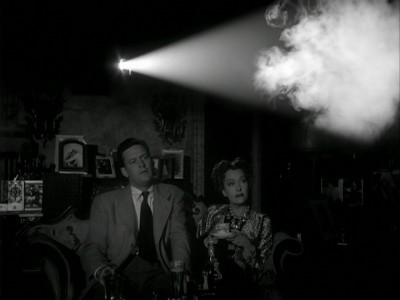
Unlike the delusionally nostalgic, narcissistic movie star at its center, Billy Wilder's classic 1950 film -- possibly his best-known and, along with Ace in the Hole, among his best-realized works -- ages very well, and it certainly labors under no naïve illusions; its then-shocking, near-nihilistic cynicism about the movie biz (like that of another William Holden showcase, Network, vis-à-vis corporatized "news") has now long since been proved utterly sane, "realistic," and prescient. Along with Nicholas Ray's In a Lonely Place, a similarly-themed Hollywood noir released the same year, it's a well-observed -- and much more hardbitten -- look at life in Tinseltown for those among the "many called" (from which few are chosen, as the cliché goes) who, despite finding off-and-on work of a sort, find the place a sort of limbo and aren't at all sure whether to count themselves among the chosen few or the damned. Holden's failing screenwriter, Joe Gillis, and, of course, Gloria Swanson as his grasping, self-styled muse, Norma Desmond, are (paradoxically, considering the idol-smashing context) immortal -- the burnt-out, near-destitute movie scribe who becomes the self-loathing kept man of the aged starlet, whose vain hopes of restoring her lost silver-screen glory will doom them both. Sunset Boulevard is a fairly vicious poison-pen letter to desperate movieland aspirations and delusions of grandeur, but Holden's delivery of Wilder and Charles Brackett's snappily tough-talking narration, coupled with Swanson's brave flirtation with self-parody, only make the film that much more unexpectedly melancholy -- sad, actually, and maybe even moving in spite of itself -- when the band-aid of sardonicism is ripped off to reveal the unfulfilled aspirations and unhealed wounds of disillusionment, both within and among the characters as well as in the film's own attitude toward the dream factory's nightmarishly dissonant rift between glorious big-screen illusion and earthbound striving and pettiness. A denunciation of Hollywood's apparently bone-deep cycle of exploitation, mendacity, and obsolescence as passionate as Sunset Boulevard's could only come, after all, from a deep, disappointed love for the captivating pictures that cycle creates (a love to which Wilder's own vibrant, long-running dedication to the medium can attest). But instead of splintering the movie apart, this irresoluble love-hate conflict gives it an inexhaustible core tension, rendering it an engaging, powerful, endlessly rewatchable paradox in itself (one that gives the film, which will enthrall any viewer, extra-special meaning for those of us who love movies): a scorched-earth, bilious exposé of a treacherous Hollywood culture and system to which the film's own eminently skilled, joyous, made-in-Hollywood achievement nevertheless stands as an undeniable tribute. DVD Talk Collector Series.
|
| Popular Reviews |
| Sponsored Links |
|
|
| Sponsored Links |
|
|
| Release List | Reviews | Shop | Newsletter | Forum | DVD Giveaways | Blu-Ray | Advertise |
|
Copyright 2024 DVDTalk.com All Rights Reserved. Legal Info, Privacy Policy, Terms of Use,
Manage Preferences,
Your Privacy Choices | |||||||









